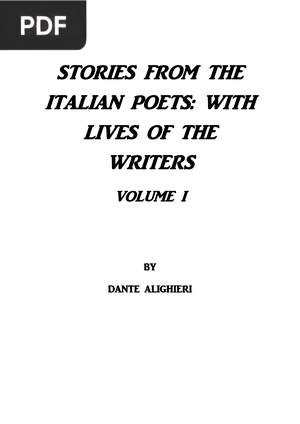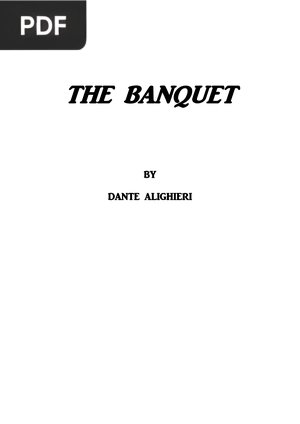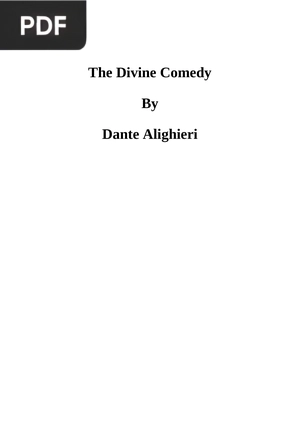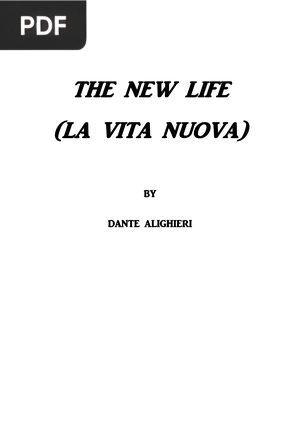Paradise
Author: Dante Alighieri
*Wait a few seconds for the document to load, the time may vary depending on your internet connection. If you prefer, you can download the file by clicking on the link below.
Information
Description: <p><strong>Paradise</strong>, also known as Paradiso, is the third and last part of Dante's Divine Comedy, after Inferno and Purgatorio. This poem was written in the early 14th century and narrates Dante's journey through Heaven. Our protagonist is guided by Beatrice through the nine celestial spheres of Heaven, to the Empyrean, which is the abode of God, allegorically representing the ascent of the soul to God.</p> <p>Dante's journey through Paradise lasts approximately twenty-four hours and begins at the top of Mount Purgatory, called the Earthly Paradise. Finally, Dante comes face to face with God, who appears as three equally large circles representing the Father, the Son and the Holy Spirit.</p> <p>Dante's Paradise is influenced by the medieval view of cosmology, drawing on Christian theology (in fact, Beatrice is said to allegorically represent theology), astronomy and classical philosophy.</p>
Pages: 161
Megabytes: 1.3 MB
This may interest you
Stories From the Italian Poets
Extension: PDF | 189 pages
<p><strong>Stories From the Italian Poets</strong> is a work that includes stories of five poets noted for their narrative, wit and creativity, these are Dante, Pulci, Boiardo, Ariosto and Tasso. It also offers biographical sketches of each of them and critical notes on their life and work.</p> <p>In the case of Dante, it presents us with a prose summary of the poet's work, to give us a complete idea of his poetry without having to resort to his metrical form. And this is achieved without making any changes or additions to the work.</p> <p>It is well known that Dante was a writer of great wisdom and creativity, which is why he created such a renowned masterpiece as the Divine Comedy. This book is intended for those readers who wish to delve into Italian poetry and, more specifically, to get to know the beautiful metaphors, detailed descriptions and beauty of Dante's writing.</p>
The Banquet
Extension: PDF | 207 pages
<p><strong>The Banquet</strong> is a work written approximately between 1304 and 1307. This unfinished work by Dante consists of four trattati, or «books»: a prefatory one, plus three books that each include a canzone (long lyric poem) and an allegorical prose interpretation or commentary on the poem that veers in multiple thematic directions.</p> <p>The Banquet is an important stage of development for Dante, very different from the visionary world of the «Vita Nova». Dante himself tells us that the prose of The Banquet is «temperate and virile», in contrast to the «fervid and passionate» prose of the Vita Nova; and that while the approach to this in the work of his youth was «like dreaming», «The Banquet» approaches it subjects soberly and wide awake, often modeling its style on Scholastic authors.</p>
The Divine Comedy
Extension: PDF | 487 pages
<p><strong>The Divine Comedy</strong> is a long Italian narrative poem begun in 1308 and completed in 1320, a year before Dante's death in 1321.</p> <p>It is considered the crowning work of Italian literature and one of the greatest works of world literature. The poem's imaginative vision of the afterlife is representative of the medieval worldview as it had developed in the Western Church in the 14th century.</p> <p>It contributed to establishing the Tuscan language, in which it is written (also in most current editions on the Italian market), as the standardized Italian language. It is divided into three parts: Inferno, Purgatorio and Paradiso.</p>
The New Life
Extension: PDF | 53 pages
<p><strong>The New Life</strong> or Vita Nova (Latin title) is a text published in 1294. It is an expression of the medieval genre of courtly love in a prosimetrum style, a combination of prose and verse.</p> <p>Referred to by Dante as his libello or «little book», The New Life is the first of two collections of verse written by Dante during his lifetime. The work is a prosimetrum, a piece containing both verse and prose, along the lines of Boethius' Consolation of Philosophy.</p> <p>Dante used each prosimetrum as a means of combining poems written over periods of about ten years: «The New Life» contains his works from before 1283 to about 1293. The collection and its style fit into the movement called Dolce Stil Novo.</p>










































